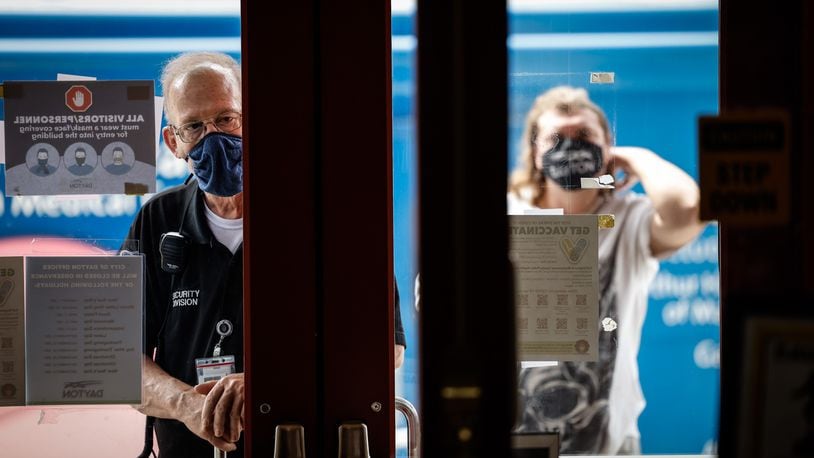But the city now plans to administer on-site rapid testing at no cost to employees, said Ann Sulfridge, president AFSCME Local 101 Dayton Public Service Union.
Credit: JIM NOELKER
Credit: JIM NOELKER
Sulfridge said it would have been unreasonable to expect workers to cover the cost of weekly testing, which she says could run as much as $75 per week, or $300 per month.
“For my folks that’s groceries,” she said. “I’m happy they’re not going to charge my members — they can’t afford $300 per month and to use their own time to do it.”
DPSU Local 101 and the police, fire and building trades unions also filed unfair labor practice charges against the city related to its coronavirus mask, vaccination and testing policy.
According to city data, nearly 1,320 of its employees responded to a request for their vaccination status, and about 1,000 (or 76% of respondents) indicated they were fully vaccinated.
About 116 employees answered they were not vaccinated, while 200 declined to disclose their vaccination status, the data show. About 500 still had not yet responded.
In August, Dayton City Manager Shelley Dickstein announced that the city planned to require its roughly 1,825 employees to be fully vaccinated or agree to submit to weekly coronavirus testing.
Dickstein said unvaccinated employees would have to pay for the tests with their own money and testing would not be allowed while workers were on the clock.
Representatives of the Dayton police, fire, building trades and blue collar and clerical workers unions criticized the policy, saying employees should not have to shoulder those costs.
Representatives also said the policy violated their contracts because it changed work conditions without negotiation or agreement from the unions.
Dickstein previously said the policy does not require union approval or action because it is a workplace safety measure during an emergency.
The city’s COVID-19 testing was supposed to begin this week, but the start date was pushed back at least until early November, according to multiple union officials.
COVID-19 testing will be self-administered by the employee in the presence of a supervisor, who will record the results and forward them to HR, the city told this newspaper.
The city said it plans to start weekly testing the week of Nov. 1.
Credit: JIM NOELKER
Credit: JIM NOELKER
The revised policy is an improvement from the original one, but the city still has been unwilling to come to the bargaining table to negotiate proposed changes to union members’ terms of employment, said Kraig Robinson, president of Dayton Fire Fighters, IAFF Local 136, the firefighters’ union.
“It’s a step in the right direction,” he said. “But we are far from reaching any type of agreement between the labor unions and the city.”
Robinson said the fire and police unions filed for grievance arbitration for unfair labor practices.
The original policy upset some members of the Dayton Building Trades Council, a union representing about 32 skilled-trades employees with the city, said Grady Mullins, executive director of the group.
The city should have consulted and bargained with its unions before trying to implement new work conditions, Mullins said.
“The biggest thing we had a problem with is they came up with this without any input from the unions at all, period,” he said. “It was kind of like a blindside: If you are going to come up with a policy that affects employees you should talked to the people who represent them first.”
Mullins said the union filed grievances and an unfair labor practice charge as well.
Later this week, Dayton city commissioners are expected to vote on whether to spend about $359,275 on over-the-counter COVID-19 tests for unvaccinated employees.
The tests would be paid for using some of the city’s federal coronavirus relief funding.
About the Author
